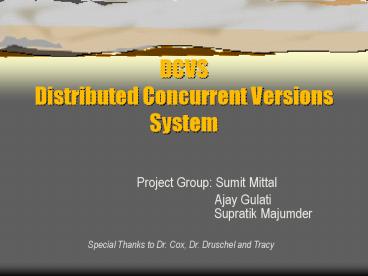DCVS Distributed Concurrent Versions System - PowerPoint PPT Presentation
1 / 27
Title:
DCVS Distributed Concurrent Versions System
Description:
Distributed Concurrent Versions System. Project Group: Sumit Mittal ... Executing CVS commands. Cost of joining/leaving the group. Let's see the cost of lunch! ... – PowerPoint PPT presentation
Number of Views:109
Avg rating:3.0/5.0
Title: DCVS Distributed Concurrent Versions System
1
DCVS Distributed Concurrent Versions System
- Project Group Sumit Mittal
- Ajay Gulati Supratik
Majumder
Special Thanks to Dr. Cox, Dr. Druschel and Tracy
2
Overview of CVS system
- Repository stored on a single server
- Client-server model
Central Repository
Latest file
Check out
User 4
update
files
diff
commit
User 1
Difference With working copy
User 3
User 2
3
Overview of Distributed CVS
Server User
Server User
Server User
Server User
request
Server User
request
Server User
Server User
reply
Server User
Server User
Server User
reply
Server User
4
DCVS vs. CVS
- Goals
- Availability High -
Low - Fault tolerance Some K - 1
- Scalability Very high - Low
- DCVS requirements
- Consistency
- Transparency
CVS
DCVS
5
Our DCVS System
A
B
I
H
C
G
D
F
E
- Nodes distributed on a circular ID-space
- Each node stores a part of the repository
- Directories replicated on the nodes
6
Distribution of Directories
A
B
I
H
C
G
D
F
E
Nodes
- Each directory hashed onto the circular ID-space
Directories
7
Distribution of Directories
A
D1
D5
D2
D4
D3
B
I
D6
H
C
G
F
D
Nodes
E
Directories
8
Replication
Replication Factor - 3
Directory myDir
Primary Node
A
B
C
Secondary Nodes
9
Example Check-out
I want directory myDir
A
I
B
H
Routing of request
myDir
Request completion
C
G
Version upgrade
D
F
E
Assume replication is 3
10
Example Commit
Assume replication is 3
I want to check-in directory myDir
A
B
I
H
myDir
Request routing
C
G
F
D
E
11
Example Commit
Assume replication is 3
I want to check-in directory myDir
A
B
I
H
myDir
C
G
Copy-set
F
D
E
12
Example Commit
Assume replication is 3
I want to check-in directory myDir
A
B
I
H
myDir
Request for acknowledgement
C
G
F
D
E
13
Example Commit
Assume replication is 3
I want to check-in directory myDir
A
B
I
Acknowledgements sent
H
myDir
C
G
F
D
E
14
Example Commit
Assume replication is 3
I want to check-in directory myDir
A
B
I
H
myDir
Run requests
C
G
F
D
E
15
No free lunch!What do you pay?
- Overhead
- Maintaining consistency
- Providing transparency
- Keeping replicas
- Executing CVS commands
- Cost of joining/leaving the group
Lets see the cost of lunch!!
16
Formal Claims
- Consistency Protocols for checkin/
checkout/update ensure consistency - Transparency User is oblivious to the location
of directories - Reliability and fault tolerance Up to K/2
nodes can fail for each directory
K is the replication factor
17
Experimental Claims
- Overhead (delay) is O(log N)
- Overhead constant with respect to K
- Overhead constant with D
N Number of nodes in the system K Replication
Factor D Number of directories
18
Experimental Claims
- Join/leave latency constant with N
- Join/leave latency increases linearly with K
- Join/leave latency increases linearly with D
N Number of nodes in the system K Replication
Factor D Number of directories Join/leave
latency measured as no. of directories transferred
19
Experimental Setup
- Implemented on PASTRY
- Wrote a driver to run the simulations
- No specific architecture used - simulations run
on available Linux machines (rivendel, nautilus) - Nodes simulated limited by capability of single
machine
20
No. of Replicas vs. Overhead
Delay (no. of hops)
12 16 20 24 28
32 36
No. of replicas
21
Nodes vs. Overhead
Delay (no. of hops)
10 20 40 50 70 80 100 150 200 250 300
No of nodes
22
Directories vs. Overhead
Delay (no. of hops)
1 10 50 100 200 350 500 600
800 1000
No of directories
23
Latency vs. Replicas
No. of directories transferred
12 16 20 24 28 32
36
No. of replicas
24
Latency vs. Nodes
No. of directories transferred
70 80 100 150 200 250 300
No. of nodes
25
Latency vs. Directories
No. of directories transferred
1 10 50 100 200 350 500
600 800 1000
No. of directories
26
Conclusion
- Consistency and transparency ensured
- Advantages far outweigh the overheads
- Scalability Overheads are constant/
sublinear/linear
So the lunch is really cheap!!
27
Discussion































